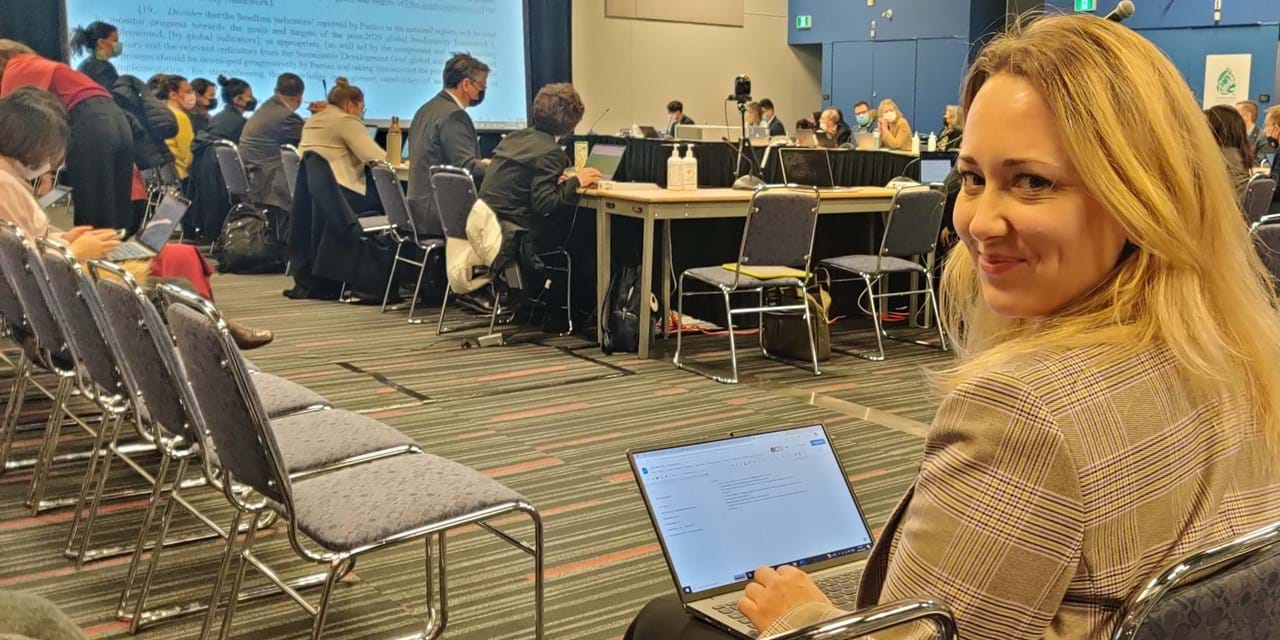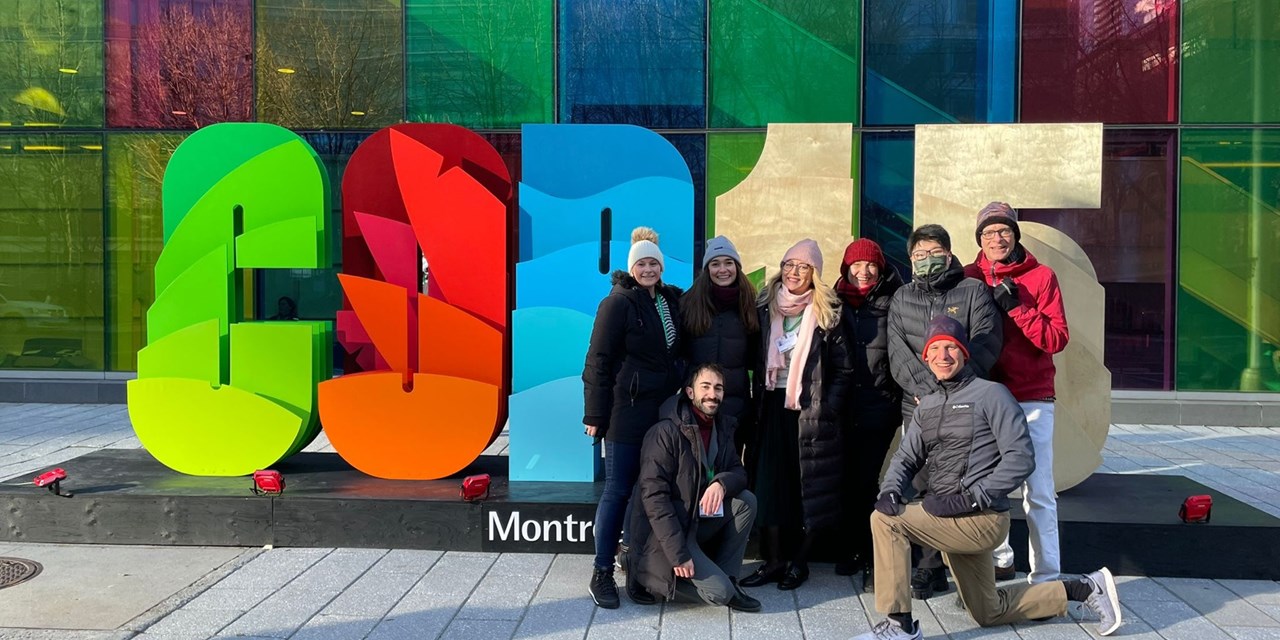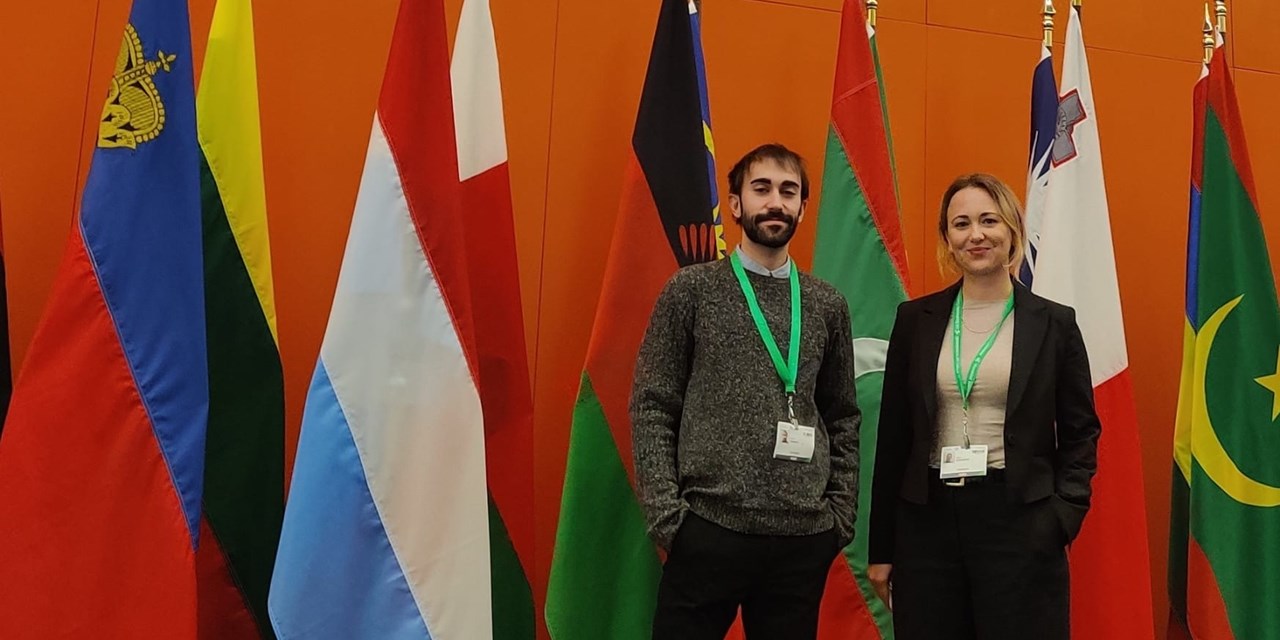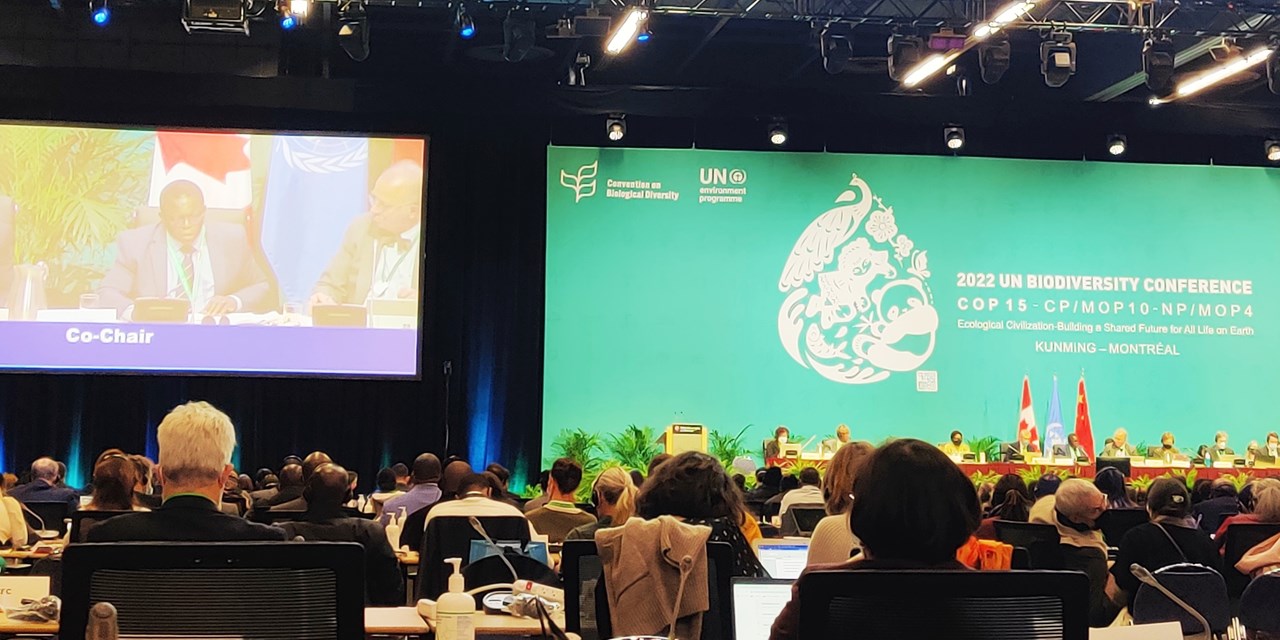ClientEarth Communications
7th December 2022


COP15, the 15th Convention on Biological Diversity, is taking place in Montreal, Canada from 7th-19th December, and we'll be there helping to shape the debate.
During COP15, world leaders will agree and adopt a 'post-2020 Global Biodiversity Framework' (GBF). The Framework, which is intended to be finalised by the end of COP15, is meant to be a strategic plan, setting global goals and targets, and detailing steps to be taken for people to live in harmony with nature up to the year 2030 and set in motion an ambitious 2050 vision.
You can find out more about COP15 and what we want to see from the outcomes here, and below we'll be sharing updates from our team on the ground at the conference itself.
In the early hours of Monday, world leaders at COP15 of the Convention on Biological Diversity (CBD) adopted the ‘Kunming-Montreal Global Biodiversity Framework’ (GBF), an agreement that aimed to set a global strategy for conserving and sustainably drawing on the world’s biological diversity.
Our lawyers have said that the final agreement is a start – but that there is a serious mismatch between its ambition and the scale of the crisis.
One of our lawyers Ioannis Agapakis, who is in Montreal said: “The final agreement is a noteworthy moment – especially given the difficulties of the negotiations and the broader socio-political tensions that surrounded the COP. But it is in no way the ‘Paris moment’ for nature we were promised – despite what civil society, NGOs and business have been calling for.
“World leaders seem to be planning around multi-decade horizons, when we only have eight years.
“Without functioning ecosystems, we cannot live on this planet – but in many cases, the GBF allows for the exploitation and destruction of nature to continue unhindered. It fails to prompt the vital transformation of sectors that are driving biodiversity’s rapid decline, or to establish the tools that would bring nature to the heart of decision-making.
“Worryingly, there are several targets where ambition is even lower than in the previous framework, particularly those related to the ‘sustainable use of biodiversity’ and the ‘ecological impact of consumption’. Backtracking on these targets shows that global leaders have failed to understand the true importance of biodiversity by shying away from transforming the global economic system and mitigating its impact on nature.
“But viewed more positively, world leaders were able to get an agreement over the line, and it contains some real cornerstones, such as recognising Indigenous Peoples’ rights throughout, a strong target for restoring nature, and the commitment to protect 30% of coastal and marine areas, as well as 30% of the world’s land. An unexpected agreement was also reached on the hot topic of digital sequencing of information.
“Though it’s not the most solid foundation from which to protect biodiversity, it nonetheless draws a line in the sand and a starting point from which to build on.”

After almost two weeks of negotiations, and three years of preparation, the Chinese Presidency of COP15 of the Convention on Biological Diversity (CBD), has published a draft agreement – now called the ‘Kunming-Montreal Global Biodiversity Framework’.
Our lawyers have reacted to the draft agreement saying that it needs several key changes before being concretised – or it could make the same mistakes as its predecessor.
Our lawyer Ioannis Agapakis said: “The draft agreement is far from the transformative framework we need to tackle the biodiversity crisis head-on.
“While the thorniest issues have been tentatively resolved, overall, the Presidency’s text errs on the lowest level of ambition for many of the goals and targets under the GBF – and this approach will fail nature. What’s clear is that the text has been decided, not on the basis of scientific urgency, but by the allure of business as usual.
“If this is the final text, then this COP will not be the ‘Paris moment for nature’ that was promised.”
Global South walkouts
On Tuesday night, at COP15 of the Convention on Biological Diversity (CBD) in Montreal, developing countries staged a walkout during the evening meetings on how the Global Biodiversity Framework (GBF) – the plan to guide countries to protect biodiversity for the next ten years – would be financed and implemented.
The walkout was led by Brazil and was supported by Argentina, Colombia and Cameroon as well as other developing countries. After hours of unproductive discussions, the Parties requested to suspend the meeting because they were unwilling to reach consensus on the draft text until an agreement was reached on ‘resource mobilisation’ i.e. how financial investments both nationally and internationally will be increased to stop and reverse biodiversity loss.
Financial support: the elephant in the room
This was the second time during this COP that developing countries have walked out of the negotiating room, and the first time in a working group meeting on the resource mobilisation issue itself.
A third walkout was also staged Wednesday morning on discussions on the monitoring framework.
It seems that until a satisfactory funding package has been agreed, the Global South is not ready to commit to agreements on several key issues – including implementation of the Framework, responsibility and transparency.
The Global North has a legal and historical responsibility to facilitate the implementation of the CBD and the Global Biodiversity Framework – from a financial and practical perspective. But developing countries seem unconvinced that the mechanisms under the CBD and the ones that are being agreed under the draft Framework will give them the financial and non-financial support they need to deliver the goals and targets to halt and reverse biodiversity loss.
Reacting to the walkouts, our lawyer Ioannis Agapakis said: “Developing countries have a legitimate reason to walk out of the negotiations because it’s clear that without additional resources from the Global North, it won’t be feasible to deliver the goals and targets of the GBF.
"This issue of who will fund the fight to combat biodiversity loss has been the elephant in the room over the past week. Because of this, the COP is now in a deadlock, with the Framework’s future – and our planet’s health – hanging by a thread.
“Developing countries have valid concerns, but they are using discussions on financial support as a bargaining chip to hold all other major negotiations hostage and this has brought negotiations to a standstill.
“This is ultimately a political issue that can only really be resolved by Heads of State coming together to reach a compromise. But Heads of national governments have decided not to attend COP15, showing once again that world leaders have not got the memo on the magnitude of biodiversity crisis and its implications for the planet – and reminds us of how we got in this mess in the first place.”

Mid-way review
We're already halfway through COP15, the Convention on Biological Diversity in Montreal, so it's time to take stock. For the past week, negotiators have been attempting to agree on the text of the Global Biodiversity Framework (GBF), which will act as a strategic plan, setting global goals and targets and detailing steps to be taken for people to live in harmony with nature up to the year 2030 and beyond.
After that wording is agreed, the politicians will move in, and talk will turn to the more politicised issues like financing, indigenous rights and implementing the Framework.
But there’s a hold-up. Instead of focusing on what the goals and targets aim to achieve, Parties have spent the last week wordsmithing - deliberating over the words used in the agreement rather than pushing forward with the ideas.
Stalled progress
One of the main topics being scrutinised is how countries plan to implement the Framework and monitor their country’s progress. Negotiators have already met three times to try and agree on this complex, yet critical topic, but have failed to finalise the text. If these issues aren’t resolved soon, they will eat up time during the High-Level segment of the COP, which forms the second leg of the COP and is dedicated to brokering deals on the more politicised issues, like how countries will measure the Framework’s implementation and how it’s going to be funded.
The High-Level segment of COP15 is a key phase of the negotiations as it will help secure much-needed political buy-in from the Parties, which been absent from the negotiations so far.
Our lawyer Ioannis Agapakis warned: “If Ministers are unable to agree on the processes and tools needed to implement the Framework’s targets and goals, then they will remain empty promises and nothing more than text on a page.”
Implementing the Framework: the positives
Despite negotiators spending the majority of the last week tinkering with individual words, there have been some fruitful discussions on the types of tools needed to implement the GBF.
Two of the most important tools are a regular global review of countries’ progress and a standardised format for how countries monitor and communicate their individual progress. Having these tools would not only help identify global gaps and shortcomings, but – most importantly – will help allocate resources where they are most needed.
More discussions are needed however, to iron out the details of those tools.
Implementing the framework: the missing pieces
To avoid repeating the mistakes of the previous Framework which failed to globally achieve any of its targets, negotiators identified two essential factors to make sure the GBP delivers its objectives:
Our lawyers believe there are still two key elements missing from the implementation package that could make or break the GBF as there would be no means to assess whether countries are on track to meeting the Framework’s goals and targets.
Without these elements to help create an ambitious implementation mechanism, the GBF will remain “toothless”, largely leaving countries to their own devices to reach the Framework’s targets, without any effective means to help scale up their national actions.
The way forward
There is clearly still a lot that needs to be discussed before reaching a final agreement. Negotiators have a challenging job of understanding new concepts, translating them into what it means nationally, and fostering trust with the other Parties as they try and navigate a way forward. Regional and development differences also strongly influence countries’ negotiating positions and the North-South divide seems, at times, unbridgeable, despite negotiators’ best intentions.
Ioannis added: “Parties may be tempted to opt for the easy way out, but reaching a compromise should not mean agreeing on the lowest common denominator – the stakes are too high.”

How are the negotiations progressing?
In the words of our wildlife lawyer Agata Szafraniuk, there are 900 words waiting to be agreed on in Montreal. These words will play a huge part in deciding the fate of global biodiversity.
Since the COP started, negotiations on all of the major topics of the Convention on Biological Diversity (CBD) and the components of the Global Biodiversity Framework (GBF) are in full swing. Parties are meeting in small groups, known as ‘contact groups’, to hash out the detail of specific topics and try and reach a common agreement. Our lawyers have been attending these contact groups and generally they are long and somewhat tedious – some starting in the evening on going on well past midnight – with many issues still up for discussion and no agreement in sight.
Our lawyers are closely following the discussions and providing expert input to the negotiators - one of the main topics we're feeding into is how to make sure there are clear processes to follow to implement the GBF’s goals and targets.
One of the reasons why Parties failed to achieve the targets of the previous framework was because there were no procedures in place to help countries apply the targets and no means of measuring countries’ progress. To avoid repeating the mistakes of the past, the GBF has to have strong and comprehensive standards and processes that Parties need to follow as well as demanding transparency on what Parties are doing to achieve the Framework, so that progress can be assessed and changes can be made where needed.
However, our lawyers are concerned that not enough time is being given to discuss this important component.
Our lawyer Agata Szafraniuk, Head of wildlife and habitats reports: “Parties could agree on the boldest goals and targets to protect nature, but if they fail to have mechanisms in place to ensure that the GBF’s goals and targets are implemented, then they will remain aspirational rather than deliverable.”
Reasons to be cheerful
However, there have been some positive developments. Parties agreed to include the UN Declaration on Rights of Indigenous Peoples in the guiding principles of the GBF that will help facilitate implementation of the GBF at national level. This means that Indigenous People and Local Communities (IPLCs) are finally being recognised as key to achieving the GBF’s vision of people living in harmony with nature. This is one of our core requirements for the GBF and we're delighted to see progress being made.
More positive news, our lawyers note that there are increasing references to a "whole-of-society" approach in the draft agreement, specifically recognising that Parties will need to have everyone on board to deliver the Framework.
What we need to see more of
For COP15 to be a success, Parties need to trust each other and work together to come to a common agreement. In particular, the agreement needs to balance the Global South's resource needs and the the Global North's ability to provide them with adequate means of implementing the GBF. Representatives from both need to find common ground for agreement if we are to stand any chance of halting and reversing biodiversity loss over the next decade.

COP15 is starting tomorrow - and for the past few days, leaders have been coming together to try to make advance progress on drafts of the goals and targets that will be the outcome of the conference. Two of our wildlife lawyers were there, helping to shape the debate.
Agreeing on the wording of these goals in advance of the conference helps to make sure an agreement is reached at the end of COP - one that will be fit to start to mend our relationship with nature.
Ioannis Agapakis, ClientEarth wildlife and habitats lawyer reports back:
"Some progress has been made, for example, on Targets relating to capacity building, public participation of Indigenous Peoples and local communities, and on the gender-responsiveness of the Framework. That being said, other discussions on more contentious topics - especially on drivers of biodiversity loss, such as land use change - were far less productive.
"For this COP to be a success Parties need to urgently act and come together to agree a Global Biodiversity Framework that actually protects nature. We're all depending on them."
